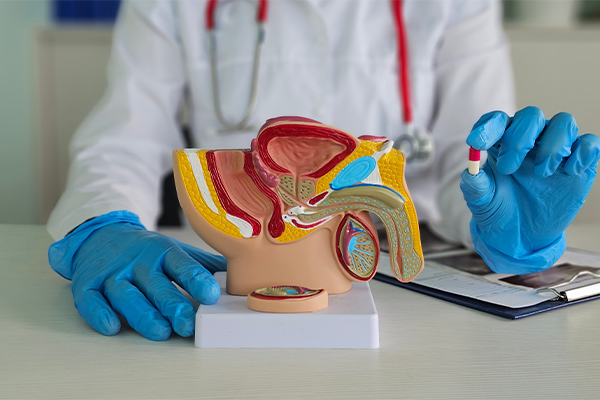
Experiencing testicular pain or swelling can be alarming for any man. These symptoms may signal anything from minor issues to serious medical emergencies. Understanding the causes of testicular pain, recognising testicular pain symptoms, knowing effective at-home testicular pain treatment, and identifying when to seek expert care are essential. This blog will guide you through all these aspects while highlighting the importance of consulting our trusted urologists in Delhi-NCR for timely and accurate diagnosis and treatment.
Synopsis
Understanding Testicular Pain and Swelling
Testicular pain and swelling can manifest in many ways, from a dull ache to sharp, intense pain or noticeable enlargement of the scrotum. Because the testicles play a crucial role in male reproductive and hormonal health, any discomfort should not be ignored.
It’s important to know that painful testicular swelling can indicate underlying problems ranging from infections to emergencies such as testicular torsion, where delayed treatment might result in loss of the testicle. Prompt medical attention is essential for preserving health and fertility.

Common Causes of Testicular Pain
Several conditions lead to testicular pain, and identifying the cause guides proper treatment. Some common causes of testicular pain include:
-
Epididymitis: Inflammation of the epididymis, often caused by bacterial infections or sexually transmitted infections (STIs). It usually causes aching pain and swelling.
-
Testicular torsion: A twisting of the spermatic cord that cuts off blood supply to the testicle. This is a surgical emergency presenting as sudden, severe pain.
-
Orchitis: Inflammation of the testicles, frequently caused by viral infections such as mumps.
-
Varicocele: Enlarged veins in the scrotum that may cause a dull ache or discomfort.
-
Hydrocele: Fluid accumulation around a testicle, resulting in swelling but usually painless.
-
Trauma or injury: Direct blows or injuries to the testicles can cause pain and swelling.
-
Inguinal hernia: Intestines protruding through a weak spot in the abdominal muscles near the groin may cause discomfort or swelling.
-
Testicular cancer: Firm lumps or painless swelling in the testicle should never be ignored and warrant immediate evaluation.
If you notice persistent or worsening testicular pain and swelling, seeking expert advice from our urologists in Delhi-NCR is imperative for correct diagnosis and timely intervention.
Recognising Testicular Pain Symptoms
Being aware of testicular pain symptoms can help you act quickly. Warning signs include:
-
Sudden onset of sharp or severe pain
-
Swelling or enlargement of one or both testicles
-
Redness, warmth, or tenderness of the scrotum
-
Persistent aching or throbbing pain
-
Nausea or vomiting accompanying pain
-
Pain during urination or ejaculation
-
Presence of lumps or abnormal heaviness
While some symptoms might suggest mild conditions treatable at home, others signal emergencies requiring immediate care. When in doubt, consult professional urologists like those at Delhi-NCR for a thorough assessment.
Testicular Pain Treatment at Home: What Can You Do?
For mild discomfort or non-emergency pain, testicular pain treatment at home may provide relief while preparing for a medical visit. Effective home care measures include:
-
Applying an ice pack wrapped in cloth to the affected area for 15-20 minutes to reduce swelling
-
Taking over-the-counter pain relievers (following dosage instructions)
-
Wearing snug, supportive underwear or an athletic supporter to minimise movement and discomfort
-
Avoiding heavy lifting, strenuous exercise, or sexual activity until the pain subsides
-
Elevating the scrotum while lying down can reduce pain and swelling in some cases.
-
Maintaining good hygiene to prevent or reduce infections
It is important to remember that home remedies address symptoms temporarily and do not replace professional evaluation. If pain persists, worsens, or is accompanied by swelling and other symptoms, immediate consultation with an expert urologist in Delhi-NCR is essential.
When to See a Urologist
Knowing when to seek specialist care is critical. You must visit our urologists in Delhi-NCR without delay if you experience:
-
Sudden and severe testicular pain or painful testicular swelling
-
Persistent pain lasting more than 24 hours
-
Accompanying symptoms like fever, nausea, or vomiting
-
Noticeable lumps or changes in the size or shape of the testicles
-
Pain or swelling following trauma or injury
-
Difficulty urinating or blood in the urine
-
Symptoms suggestive of testicular torsion or cancer
Early diagnosis by experienced urologists ensures timely testicular pain treatment and prevents complications such as loss of a testicle or infertility.
Diagnostic Approach by Urologists
Our urologists in Delhi-NCR use a systematic approach involving:
-
A detailed medical history and physical examination
-
Ultrasound of the scrotum to visualise the testicles and blood flow
-
Urine and blood tests to identify infections or inflammation
-
Additional imaging when needed
-
Biopsy or tumour markers if cancer is suspected
This comprehensive evaluation ensures accurate diagnosis and guides personalised treatment plans.
Testicular pain and swelling require attentive care and should never be ignored. Our expert urologists in Delhi-NCR provide compassionate, accurate diagnosis and effective treatment tailored to your needs. Early intervention ensures the best possible outcomes to maintain your reproductive health and quality of life. If you experience any worrying symptoms, do not delay; schedule a consultation with us today.
FAQ's
Common causes include epididymitis, testicular torsion, orchitis, varicocele, hydrocele, trauma, inguinal hernia, and testicular cancer.
See a doctor immediately if you experience sudden, severe pain, swelling, fever, nausea, lumps, or pain that lasts more than 24 hours.
Yes, ice packs, painkillers, supportive underwear, rest, and scrotal elevation can provide temporary relief, but do not replace medical care.
Yes, painless lumps or swelling can be signs of testicular cancer and must be checked by a urologist promptly.
They perform physical exams, ultrasounds, lab tests, and sometimes biopsies to determine the cause and plan effective treatment.






















 5 Min Read
5 Min Read





.png)















